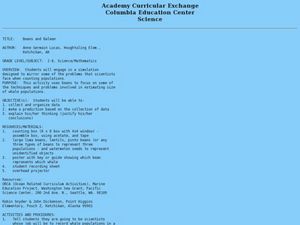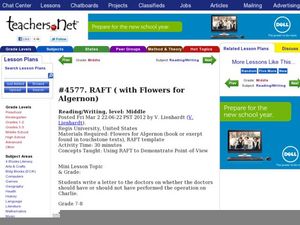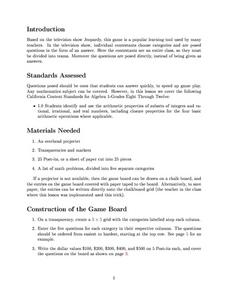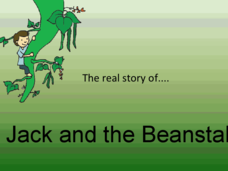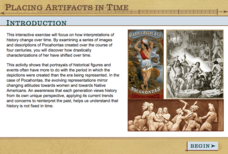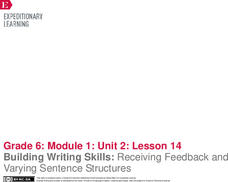Curated OER
Beans and Baleen
Predict whale populations using different beans as whales! Learners observe different types of beans in a dish knowing that each bean represents a different kind of whale. They then predict how many "whales" there are in a certain area....
Denver Art Museum
Lesson: That's Not Natural
Any time kids engage in a design project, they are building problem-solving skills, collaborative learning skills, and creative thinking skills. Upper graders take a nature walk to observe and sketch organic shapes and lines that they...
Curated OER
New York English Language Arts Test: Grade 6
This comprehensive end-of-year language arts test requires that sixth-graders demonstrate their listening, writing, grammar, spelling, and punctuation skills. It includes 9 essay/short answer questions; however, the story, "A Winning...
Curated OER
Henry VII - How Did Henry VII Get Up In the Morning?
Examine the daily life of Henry VII. In this Henry VII lesson, learners answer questions about the life in Medieval times after looking at primary source documents which are translated into contemporary English.
Curated OER
Eloquent Words
Logan’s Lament, a speech delivered by Mingo Chief Logan in 1774, provides pupils with an opportunity to not only study the historical events surrounding the battle between Native Americans and the Europeans for the West Virginia...
Florida Center for Instructional Technology
Communicating with Mentors
Nothing says 21st century learning skills like an Internet-based collaborative learning lesson plan focused on using technology to compile and synthesize information. An embedded video shows you what collaborative learning in high school...
Curated OER
Understanding Plagiarism--Worksheet 1
Understanding plagiarism is the goal of this worksheet. After reading the two definitions of plagiarism listed on the sheet, class members decide whether the eight listed scenarios constitute plagiarism. Their responses are used to...
Curated OER
Distinguished Discoveries: Florida quarter reverse
Florida's state quarter has an image of a space shuttle and a Spanish Galleon on its reverse side. Pupils will examine the state quarter and think about how the Spanish explorers and Space explorers are the same and different. The class...
Curated OER
Student Opinion: Are You Popular, Quirky or Conformist?
Approach the topic of popularity with this resource from the New York Times and their Learning Network series. The article is about Alexandra Robbins' "Quirk Theory." Learners respond to the article excerpt either on paper or online....
Curated OER
Flowers for Algernon: RAFT
Should Charlie undergo an operation to increase his intelligence? A mini-instructional activity for a unit on Daniel Keyes novel Flowers for Algernon uses a RAFT activity, which prompts students to write a letter to Charlie's doctors...
Curated OER
"Champion of the World"
“Champion of the World,” a chapter from Maya Angelou’s I Know Why the Caged Bird Sings, is the subject of a study guide that asks readers to consider the author’s purpose, the function of the chapter in the entire narrative, and...
PBS
Earthquakes and Volcanoes
Earth's surface constantly changes thanks to a variety of geological forces; in fact, Australia currently moves faster than GPS technology. Scholars connect the idea of continental drift to earthquakes and volcanoes with the help of an...
National Endowment for the Humanities
Doing Oral History with Vietnam War Veterans
Get the story from those who experienced it. Engage learners with a structured oral history project involving Vietnam War era veterans. By conducting thoughtful interviews, class members learn what it was like to serve in the...
Curated OER
Positive/Negative Bugs
Bugs can be creepy - and fun! Kids create a positive and negative design by repeatedly drawing a simple insect overlaid with a geometric shape. The outcome is really neat and will help build spacial reasoning, visual acuteness, and...
Curated OER
Mathematical Jeopardy
Middle schoolers use the popular game of Jeopardy to explore different mathematical concepts. They are highly engaged with the use of technology for this lesson. They function using higher-order thinking skills in order to create their...
Curated OER
Story switch up
Gather your class around to hear the real story of Jack and the Bean Stalk. In this version Jack is mean and rude, and the Giant is friendly and kind. Have your class rewrite a classic fairy tale to build strong written communication...
Curated OER
Word Pair Analogies 8
Working on analogies in your language arts class? Use this straightforward worksheet to address common techniques and strategies used to solve analogies. This activity is a great way to review vocabulary and to reinforce logical thinking...
CK-12 Foundation
Ramp and Piano
Can you lift a piano into a truck? Simulation allows scholars to explore the relationship between force, ramp length, and weight. Pupils control the variables of truck bed height, ramp length, weight of piano, and the number of friends...
National Nanotechnology Infrastructure Network
Coffee Break with Nanoscience: Film Formation and “Coffee Rings”
Prepare scholars for micro and nanoscale investigations. A lab activity allows individuals to practice their experimental techniques while becoming to accustomed to the smaller scale of the materials. They also make decisions about the...
101 Questions
Neptune
Examine an innovative approach to a large-scale model. Pupils across the state of Maine teamed up to create a model of the solar system that spans 40 miles. Put thinking skills to work within your classes as they make the calculations to...
Annenberg Foundation
Placing Artifacts in Time
Can history distort the true story behind famous people? Scholars analyze the many faces of the Native American Pocahontas. Incorporating technology and historical thinking skills, they uncover the many different sides to the Pocahontas...
New York State Education Department
Global History and Geography Examination: August 2015
Need a comprehensive test about global history and geography? Look no further! Test young historians' understanding of how to use primary sources to formulate answers with an assessment that uses multiple-choice questions that require a...
Howard Hughes Medical Institute
Natural Selection and Evolution of Rock Pocket Mouse Populations
Can evolution repeat itself? Scholars analyze amino acid data in two separate populations of mice. They learn that evolution repeats itself, but natural selection prefers some mutations over others in different environments. Analysis...
EngageNY
Building Writing Skills: Receiving Feedback and Varying Sentence Structures
Everyone is good at something. Scholars receive their mid-unit assessments with feedback. They look over their papers and write their strengths as a writer and goals on index cards. The class then has a mini lesson in using sentence...
Other popular searches
- Higher Order Thinking Skills
- Creative Thinking Skills
- Higher Level Thinking Skills
- Critcal Thinking Skills
- Analytical Thinking Skills
- Building Thinking Skills
- Independent Thinking Skills
- Practical Thinking Skills
- Visual Thinking Skills
- Thinking Skills Beginning
- Math Thinking Skills
- Biology Thinking Skills


